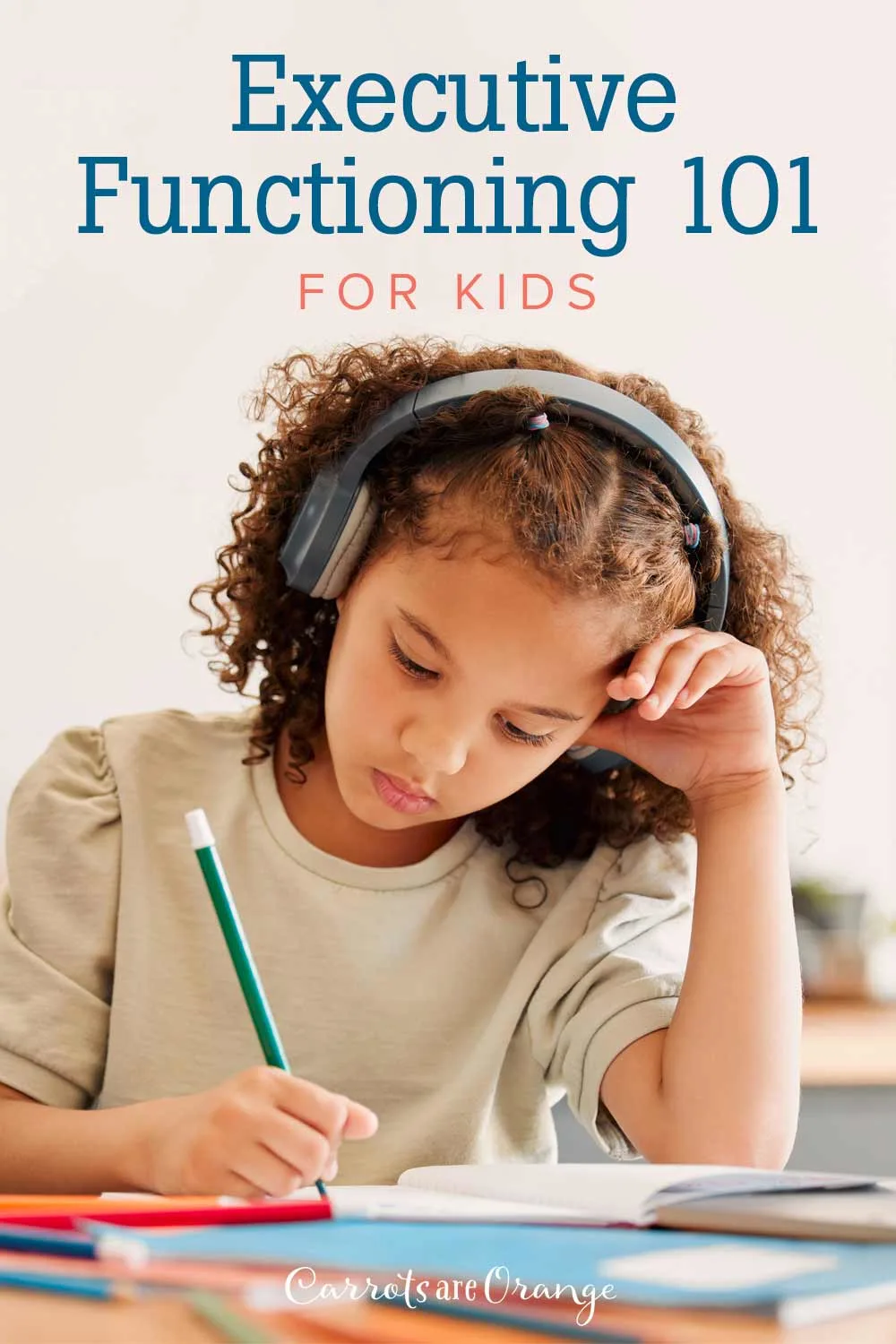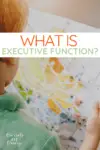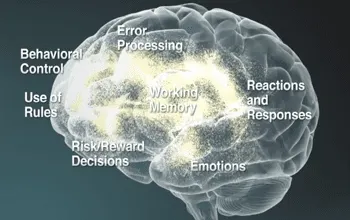Do you have a child who is a bit “all over the place”? Is he a “paper stuffer”? When you enter his room, do you have to push open the door because it is such a mess?
We can share frustrations and laugh about these kids, but these tendencies will cause many problems as they grow and develop into adults. If you are in this boat, then the issue is one of an executive function disorder and maybe even an issue with mental health.
What is Executive Dysfunction?
Consider this post an introductory guide to executive function, what it means, signs of executive dysfunction, and strategies to develop these skills in kids struggling with executive functioning.
Are you concerned about your child?
In most cases, there’s nothing to worry about; every child develops differently. What may appear as learning disabilities are learning differences, and some children need unique forms of attention to inspire their abilities.
Some persistent deficiencies, however, can be indicative of a serious learning disorder, so it’s important to learn more about executive skills and how to foster these skills in your child if he or she seems to be behind. So, let’s dig a bit deeper.
Definition of Executive Functioning
The Center on the Developing Child at Harvard University defines executive function skills as “the mental processes that enable us to plan, focus attention, remember instructions, and juggle multiple tasks successfully.”
These skills allow us to focus on particular details, prioritize effectively, and enforce delayed gratification to ensure things get done.
Executive skills aren’t innate. While some children have more potential to develop practical executive skills than others, these skills are essentially a product of a child’s brain chemistry and environment.
Identifying the Gaps & Creating a Plan
One of the essential factors in developing these skills is identifying the gaps in executive function early in a child’s life.
Once observed, teachers and parents can implement and create a plan including activities, exercises, and perhaps outside therapy to assist in a child’s development of executive skills.
In extreme cases, adverse environmental factors can prevent normal brain growth and cause children to exhibit hyperactive or disruptive behaviors.
Furthermore, impediments to the normal development of executive functioning in young children can have continuing negative effects throughout a child’s developing and adult years.
So, learning about the symptoms of poor executive functioning and the strategies that can be used to improve this critical developmental factor can help parents and caregivers guide at-risk children, back on positive developmental tracks.
It is important to remember that children are not born with these skills. Instead, they are born with the potential to develop these skills.
Executive Dysfunction & ADHD
Executive Function Disorder is often associated with attention deficit hyperactive disorder (ADHD). ADHD is considered to be a type of executive function impairment but certainly not every child with executive dysfunction has ADHD.
A child may be considered to have EFD when his or her skills appear out of sync with her development.
According to the ADD publication ADDitude, children start developing these skills at age two. These functions continue to develop until age 30.
ADDitude estimates that people with ADHD can experience delays in the development of executive functioning by up to 40 percent, and it’s believed that EFD may be linked to poor development in the prefrontal cortex.
Parts of the Brain Impacted by Executive Dysfunction
The three main areas involving executive functioning are working memory, self-regulation, and mental flexibility. These three areas are interrelated and affect most areas of the brain. For EF to execute effectively, all three areas much work together.
{Source: Center on the Developing Child at Harvard University}
Examples of Optimal Executive Function Skills
There are seven types of skills:
- Self-awareness
- Self-restraint
- Non-verbal working memory
- Verbal working memory
- Emotional intelligence
- Self-motivation
- Planning and problem solving
In children with EFD, most or all of these executive skills are inhibited. By using various exercises and techniques, it may be possible to boost or restore executive skills in affected children.

Symptoms of Executive Dysfunction
Symptoms & Signs
While children with ADHD often have trouble paying attention to activities in the present, children with EFD cannot plan for the future. Children with this disorder have trouble setting schedules or staying organized, and they may habitually lose personal items.
Some common Executive Dysfunction symptoms include:
- Not able to effectively analyze a task
- Failure to develop an effective plan for taking care of a task
- Inability to plan out specific steps necessary to complete a task
- Failure to develop reasonable timelines for achieving tasks
- Unable to adapt to new conditions or adjust procedures when achieving a task
- Failure to complete tasks on time
Emotional Regulation & EFD
In young children, EFD may show itself as angry or frustrated behavior. Young children with EFD may have trouble handling setbacks, and they may throw tantrums over seemingly minimal issues.
Instead of capably expressing their emotions with words or other socially acceptable mediums of expression, children with EFD may act aggressively. They may also resist the normal flow of classroom behavior and stubbornly choose to act on their impulses rather than follow the established protocols.
As children with these issues get older and enter grade school, they become highly resistant to any changes in routine. In addition, their organizational difficulties become more pronounced.
During middle school and high school, failures to adapt to social norms and implement systems to help with EFD may lead to becoming increasingly socially withdrawn. Additionally, they may engage in risky behaviors. For example, they may have trouble choosing careers or holding down jobs.
What Kids with Executive Dysfunction Need Most
- Systems on which to rely
- Growth Mindset
- Routines
- Baby Steps. In other words, celebrating small victories with your child. The development of these skills is not going to happen overnight. Often it takes years, so acknowledging baby steps and leaning into positive behavior is a big way to a while
Skill Development
Below are examples of skills on which to focus.
Here is a short list:
- Ability to plan ahead
- Time management
- Prioritize tasks
- Decision making
- Able to inhibit thoughts & actions, not be impulsive
- Focus & attention
- Juggling memory
- Pivoting
- Self-starting
- Follow-through
- Reflectiveness (this is where mindfulness exercises come in really handy)
- Regulating emotion
Strategies & Treatment for Executive Dysfunction & ADHD
Most instances of executive function disorder manifest at an early age, so early intervention is critical. For example, one of the best ways to help develop skills to combat these challenges is to expose to activities and exercises that will help close gaps.
With that said, once it’s clear that executive function disorder is interfering with a child’s ability to learn and develop socially, it may be helpful to enlist the assistance of professionals to evaluate your child with an executive dysfunction test.
For instance, speech therapists, reading tutors, or psychologists test & guide your child. Finally, a specific neurological test will pinpoint the exact areas that need focus.
In-class behavioral modification techniques, such as daily report cards and token systems, may be effective strategies. Adults might consider using external information crutches like cards, smartphone apps, and sticky notes to improve focus and motivation.
Related Read: Activities Guide: Enhancing and Practicing Executive Function Skills with Children from Infancy to Adolescence
Lastly, children with EFD may be responsive to the same stimulant drugs used to treat ADHD. However, as in all cases of behavioral issues, drugs should be relied on as a last resort after behavioral modification and positive forms of adult support have failed.

Help Your Child Create a System
The bottom line, parenting a child with ADHD is challenging. A child needs to create a system that works for him.
This system may include the following:
- a paper management system
- a binder system (this doesn’t work for most children with executive function disorder)
- a folder system with specific labels written in large print with the name of the subject and the child
- grade monitoring
- self-advocacy when his body doesn’t quite feel right and he is unable to focus, ask the teacher or parent to take a break, drink some water, grab a fidget, or use headphones
- secure study space that works for the child, perhaps near natural light, in a cozy chair, with a divider, with headphones
- weekly overhaul to clean out the backpack, desk, cubby, etc
- daily check-ins asking the questions: What is my most important thing today? What am I forgetting?
- create a today list every day with no more than four items to avoid overwhelm
- chunking by time and task using a timer
- less is more, so taking the time to declutter every week
Activities to Help Executive Functioning Skills
There are a variety of activities that may assist a child with executive function disorder in attaining normative cognitive and social development. Here are some examples of practical executive function activities:
#1 – Skill-Building Games
There are several board games and other types of games that you can play with your child to encourage the healthy development of executive skills. While it’s unclear how much these games improve the symptoms of EFD, they provide opportunities to spend quality time with your child. The connection will undoubtedly improve his or her social adaptability and overall happiness.
#2 – Competitive Sports
Competitive sports are some of the best activities for executive function disorder. These types of activities assist children in developing social skills, and they also boost cognitive flexibility and anticipation.
While any physical exercise will help with the symptoms of EFD by improving overall health, team sports allow children to become closer to their peers and learn more about working together to achieve shared goals. It isn’t necessary to compete in physical sports; any competitive activity, such as chess, will improve executive functioning in children.
#3 – Musical Activities
It has long since been concluded that music helps improve brain functioning, and listening to music can help children with EFD focus and regulate their emotions. The benefits of music become even more pronounced, however, when you encourage your child with EFD to learn how to play an instrument.
#4 – Creative Outlets to Assist with Executive Function Disorder
Drawing, building, and designing, whether in 2D or 3D, are enormously helpful for a high-performing child with executive function dysfunction. In many cases, children with executive dysfunction are also gifted, so their brains are often on fire. Therefore, the adults in their lives need to make sure these children have outlets.
Helping Your Child with Executive Function Disorder
I attended a conference on parenting gifted children recently. One of the presenters, Seth Perler, focused his presentation (and life’s work for that matter) on helping gifted children with these gaps in executive functioning.
I took away a ton from his talk. His main takeaway, which I believe he emphasized, was that our relationship with the child matters the most.
Children with these tasks often struggle with big emotions, depression, anxiety, and poor self-image. In other words, children experience and feel the world differently than a typical human being does.
As we work with them through developing their weaknesses into strengths, we must develop a strong, solid, loving, genuine relationship with them.
Furthermore, don’t allow the child to define himself or be defined by his giftedness or “disability”. It was a powerful way to end his extremely practical talk outlining helpful strategies for teachers and parents.






